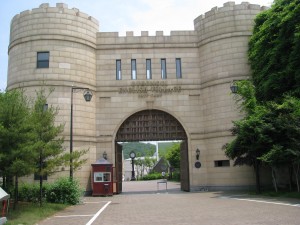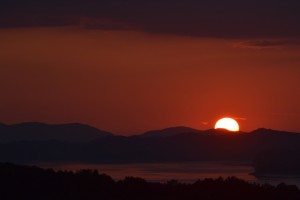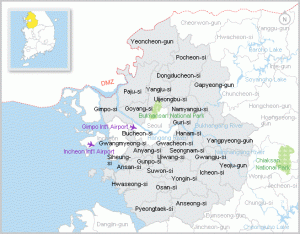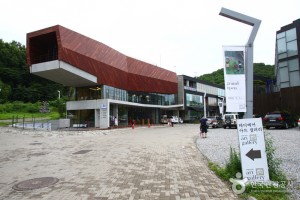This is my latest in my “Strange Places I’ve Called Home” series. The rest can be found here.
My first time up to Paju came two weeks before starting my new job at English Village. The first thing I noticed was the sky. It was a peculiar shade in Paju: Blue. I had become accustomed to a sort of yellowish, grey sky in Seoul, so the lack of smoggy haziness was stark.
I immediately had the sense that I was in a location unlike any other in the world. Paju is distinctly suburban, and also distinctly touristy and wholly manufactured. It also overlooks the North Korean border, creating the clearest of contrasts between the World’s Haves and Have Nots. Sure, the 45-minute bus ride from Seoul can be a bit terrifying, with the length of the Han River surrounded by tall fences, razor wire, guarded watch towers, and tanks, but the bright neon lights shine all the brighter compared to the total darkness that falls over the far side of the river every night.
Seoul was close, and yet far, far away. In Paju, I had fresh air to breath, open spaces to let my dog run about, and almost everything I needed was within walking distance. I could see the stars at night (and often the sounds of gun fire from training exercises near the border). And yet, Seoul was still there when I needed it. Indeed, it was much easier to live out of the city and go in when needed, than to live in the city, and leave when I needed some space and fresh air. Ironically, it was now actually a shorter trip to the fashionable Hongdae area of Seoul than when I actually lived within the city limits.
Paju was technically upgraded from a county to a city in 2007, but this is a highly misleading designation. Although there are small, concentrated urban areas within the Paju limits, it is wide and expansive, and not at all a cohesive unit. However, this relatively small, largely rural and suburban community still boasts a population of over 400,000 people, because the Seoul Metropolitan Area is just like that.
My life in Paju centered around my work and home, English Village. In 2006, the Gyeonggi Provincial Government had the bright idea to build a school/theme park for the low, low cost of $100 million, because I guess that’s what countries with a great deal of new-found wealth do. Since that time, English Village has been a second-rate school, and a third-rate theme park, and continues to bleed money. Please don’t confuse my jibe for a criticism of the school or park staff, but there’s only so much they can do without the proper time or funds. I loved my time at English Village, and for the most part so did my students. But I don’t know what can be reasonably expected to teach them in a week’s time.
Still, the school managed to give the students a unique experience that they simply can’t get elsewhere. Every week, a new group of middle school kids are bused in from all around the donut-shaped province of Gyeonggi. Students also occasionally arrived from Japan, China, and Russia, so clearly we offered a worth-while experience. Either that, or our brochures are fantastic. Once there, they get a total English immersion experience in content areas as unique as cooking, science, media, and drama. English Village would readily remind you of this throughout the day by blasting its theme song all over campus, “Science, science, I love science! Media, media, I love media! It’s great! It’s fun! It’s English Village!” I still hear that song in my nightmares.
Joking aside, I quite liked my time at English Village, despite, or perhaps because it ranks so high on the “Strange Places” list. The campus is a beautiful place to live, and even it’s fake, how many people can say they’ve lived at a castle? My coworkers and students were generally much more positive and happy than at my previous job, so the atmosphere was much lighter. It was also physically lighter, as we were outside a great deal of the day, and not trapped in classrooms behind opaque plastic coverings on the windows. Of course, people found things to complain about because people always do, but generally we were able to laugh it off most of the time.
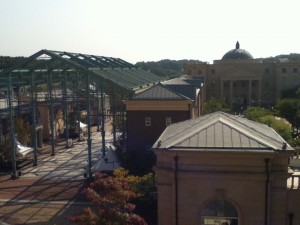 I really can’t say enough about the staff who made English Village what it is. Perhaps it was the environment, or being outside with beautiful scenery, or the curriculum, or the ability to have input into our lesson plans, or any number of other factors, but the teachers were by and large a fun, zany, and competent group. The teachers came from all walks of life, but we still managed to make the whole system work, and enjoy ourselves in the process. And as a rule of thumb, when the teachers are having fun, so are the kids.
I really can’t say enough about the staff who made English Village what it is. Perhaps it was the environment, or being outside with beautiful scenery, or the curriculum, or the ability to have input into our lesson plans, or any number of other factors, but the teachers were by and large a fun, zany, and competent group. The teachers came from all walks of life, but we still managed to make the whole system work, and enjoy ourselves in the process. And as a rule of thumb, when the teachers are having fun, so are the kids.
We had a great deal of camaraderie among the staff, even between the native English teachers and the Korean teachers–a very difficult feat to accomplish in my experience. Unlike at my previous job, when everyone was so tired and beat down at the end of the day to socialize, there was always someone interested in a meal out at a local restaurant, or a trip into Seoul, or just hanging out in an apartment with a few beers. One of our favorite activities was climbing the small hill behind our apartments and watching the sun set on North Korea; we would drink beer, reflect on our day, and watch the not-so-distant hills disappear into the inky abyss, with no electricity to illuminate them. It was a stark reminder that no matter how bad our days were, there were people suffering far worse within walking distance (assuming you could get through the guards, razor wire, and landmines).
Immediately adjacent to English Village is Heyri, a collection of arty and trendy restaurants, cafés, and shops. The area appeals to well-to-do Seoulites looking to get away for an evening or a weekend. In a not completely unrelated note, the town has since become known for the dubious distinction of being an adulterers’ paradise. On any give trip to Heyri, we would see rich, middle-aged business men enjoying the company of a woman who most would consider just a tad too young. The reputation could be off-putting to those not seeking illicit encounters; many of my female Korean friends and coworkers said that they felt judged by others when simply trying to enjoy a nice meal there.
Philandering couples aside, Heyri does well at taping into the previously discussed Korean coffee culture. Tourists show up every weekend in droves to experience coffee without the bitter aftertaste of air pollution.
And while they’re there, it’s only a short hop to the Paju Premium Outlets. As I’ve said before, the Koreans love to shop, and this new, expansive mall gives them just the opportunity to do so. When I stepped into the mall the first time, I had a horrific moment of reverse culture shock as I realized I had traveled half-way around the globe to find America. Once the moment subsided, I thought I’d look around for some good deals, only to be horrified again by their supposed “discount” prices.
Living in Paju was strange, not for what it was, but for what it was not. It was the least authentic Korean experience in Korea. Heyri, the Outlets, and English Village are all tourist traps designed by Koreans to imitate Western culture. Sadly, I wanted more Korean culture, because after nearly two and a half years, I completely fell in love with the place. The restaurant in Paju I visited more than any other was not one of the fashionable Heyri cafés, but the local kimbap joint, where I could dine on a wide assortment of Korean dishes, and as much kimchi as I could possibly handle (which was substantial by the end of my stay).
I loved my time there. I met great friends and enjoyed my job. But all good things must come to an end. My end came rather unexpectedly, only a few months after renewing my contract. I may have soured a bit on English Village toward the end of my stay (for reasons too far afield for this topic), but I wouldn’t have left had it not been for Christine. I wonder how long I would have stayed at this strange little place if love hadn’t pulled me out of my comfortable place inside the walls of a fake castle? This is one of those unanswerable “What if?” questions. Instead, I must take the theme song, and revise it to the past tense: It was great. It was fun. It was English Village.

